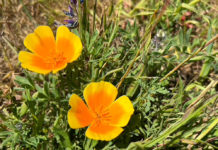Dear readers: I am really having trouble writing this column today because I have just learned that my editor, Ray Holley, will be employed by a new entity at the close of this month.
I have been “writing to Ray” for decades. It is the face I see, the voice I hear, the words I read after I hit the “send” key. I always enjoy the title he choses to introduce my column.
As Ray wrote, “Renee, you have outlasted another editor.” I wish that weren’t so. I am not at all sure how the next editor will respond to my often quirky, always repetitive thoughts.
Will that person understand, as Ray would, that the world of agriculture is at the mercy of the calendar? It is always time to thin fruit in spring; weed gardens during the growing season; trellis tomatoes; haul in winter squash after a few light frosts. So predictable.
This will be my last column sent to Ray. The next one will be to a new email address and a new reader — with his/her own ideas of how a story should be told.
My original subject matter planned for today has to be placed on the page, but it still feels oddly disconnected to its destination. It deals with a frog, just one frog and a tiny one at that, and closes with some comments overheard at market, to make you smile, after I’ve made you sad.
The other day I gathered fresh beets from the garden, washed them in the outside sink, placed them temporarily in a small pail with a few inches of water and brought them into the kitchen. I set them on the counter, to use in next day’s salad.
Meanwhile, it was time to cook wonderful Romano beans we have been enjoying which friends have provided over these weeks. I have a propane stove top and I finished steaming the beans for three minutes, turned off the gas, and took the pot over to the sink to pour out the boiling water.
I was returning to the stove to place the pot back on the burner to cool when, to my horror, a tiny frog was hopping madly on the hot surface where the beans had been steamed.
The grill plate prevented me from grabbing him instantly and so it took more seconds to put a pot holder in my hand, remove the iron grill — all the while watching that small creature endure the torture of burning his previously cool, wet skin.
By the time I lifted him off the hot metal, he was immobile. I brought him out to the garden and made a puddle for him. I knew it was hopeless, but I thought if he had even a tiny speck of conscious feeling left in him (or her) the cooling water would bring him peace at the last moment.
It’s been four days and I am still sad about that frog. So, I need to change the subject. On to customer comments at the market, which are often unexpected, sometimes puzzling, always interesting.
On the Saturday market when the wind was blowing with considerable gust, my daughter, Sarah, and I decided to take down our three umbrellas before they set sail for other destinations, knocking folks in the head.
“Why are your umbrellas down?” asked a number of customers. Sarah reported that this question was posed a number of times. The wind? The wind? Is anyone noticing the wind?
Another question to Sarah regarding the preserved and dyed eucalyptus bundles she presents for sale this time of year: “Will eating the eucalyptus poison my cat?” Although not completely sure of the answer, she chose the safe reply: “Yes, it will poison your cat.”
Lastly, the constant loofah question: “What are those? Do you eat them? Don’t they grow on the bottom of the ocean?” Nine out of 10 customers assume we have been deep sea diving scavenging for loofah sponges. I think we need to have a series of photos chronicling the life of the loofah.
The best thing about a loofah is that it doesn’t leap out of its basket onto the stove, but it does blow away in a wind gust, and I’m still unhappy sending this story to my friend and editor for the last time.
Renee Kiff weeds and writes at her family farm in Alexander Valley.









